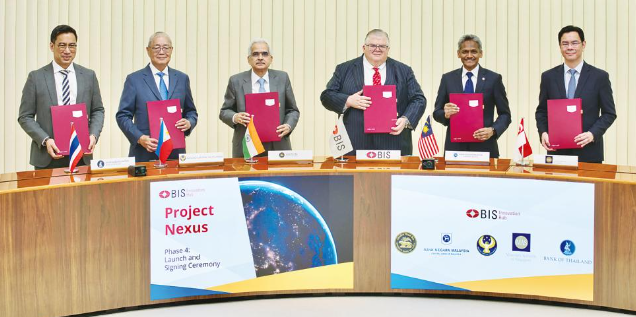Project Nexus of BIS (GS Paper 3, Economy)

Introduction
- On July 2, 2024, the Reserve Bank of India (RBI) announced its participation in Project Nexus, a significant multilateral initiative aimed at enabling instant crossborder retail payments by interlinking domestic Fast Payments Systems (FPSs).
What is Project Nexus?
About:
- Project Nexus is an initiative conceptualized by the Innovation Hub of the Bank for International Settlements (BIS).
- Its objective is to enhance crossborder payments by connecting multiple global domestic instant payment systems (IPS).
- This project is the first BIS Innovation Hub initiative in the payments area to move towards live implementation.
Members:
- Project Nexus aims to connect the FPSs of four Association of Southeast Asian Nations (ASEAN) members: Malaysia, Philippines, Singapore, and Thailand. India will be among the founding members and first movers of this platform.
- Indonesia is expected to join the platform in the future.
- The agreement was signed by the BIS and the central banks of the founding countries in Basel, Switzerland.
Benefits of Project Nexus
- Streamlined Connections: Project Nexus aims to centralize how IPS connect globally, eliminating the need for custom connections with each new country. This is achieved by centralizing connections through a single platform.
- Efficient Payments: A single connection to the platform allows a fast payment system to reach all other countries on the network. According to BIS, connecting IPS can enable crossborder payments from sender to recipient within 60 seconds in most cases.
- Enhanced Bilateral Connectivity: While India and its partner countries benefit from bilateral connectivity of FPS, a multilateral approach through Project Nexus will further enhance the international reach of Indian payment systems.
India's Involvement
- The RBI has been actively collaborating bilaterally with various countries to link India's Fast Payments System (FPS) UPI with their respective FPSs for crossborder Person to Person (P2P) and Person to Merchant (P2M) payments.
- Notable collaborations include Bhutan, UAE, France, Sri Lanka, and Mauritius.
About the Bank for International Settlements (BIS)
- Establishment and Ownership: Established in 1930, the BIS is owned by 63 central banks, representing countries that account for about 95% of world GDP.
- Head Office: The BIS's head office is located in Basel, Switzerland, with representative offices in Hong Kong SAR and Mexico City, and Innovation Hub Centres around the world.
- Innovation BIS 2025: This is BIS’s medium term strategy that leverages technology and new collaboration channels to serve the central banking community in a fast changing world.
- Basel Banking Accords: These are global rules set by the Basel Committee on Banking Supervision (BCBS), operating under the BIS, providing guidelines for best practices in banking.
Services Provided by BIS:
- A forum for dialogue and broad international cooperation.
- A platform for responsible innovation and knowledgesharing.
- Indepth analysis and insights on core policy issues.
- Sound and competitive financial services.
Conclusion
- Project Nexus represents a significant step towards enhancing the efficiency and reach of crossborder payments.
- By joining this initiative, the RBI is poised to further expand the international connectivity of India's payment systems, fostering greater financial inclusion and economic integration on a global scale.


